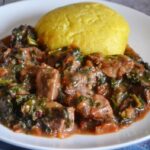West African cuisine is a treasure trove of flavors, and one dish that exemplifies the region’s culinary prowess is Suya. Originating from Nigeria, Suya is a popular street food that has captivated taste buds around the world. These grilled skewers, packed with smoky, spicy, and savory flavors, offer a tantalizing experience that showcases the vibrancy and diversity of West African cooking. Let’s explore the origins, ingredients, and the mouthwatering delight of Suya.
Origins and Cultural Significance
Suya holds a special place in Nigerian and West African culinary traditions, particularly among the Hausa people of Northern Nigeria. It has become a staple street food, often prepared and sold by skilled Suya vendors who specialize in grilling and seasoning the meat to perfection.
The cultural significance of Suya goes beyond its culinary appeal. It serves as a communal and social gathering food, bringing people together as they enjoy the flavorful skewers and engage in lively conversations. In Nigeria, Suya is commonly consumed at outdoor events, parties, and celebrations, fostering a sense of camaraderie and togetherness.
Ingredients and Flavor Profile
At the heart of Suya is the choice of meat, typically beef, although other meats like chicken, goat, or offal can be used as well. The meat is thinly sliced and marinated in a blend of spices before being skewered and grilled. The spice blend, known as Yaji, is the secret behind the distinctive flavor of Suya.
Yaji consists of a combination of ground peanuts (groundnuts), chili peppers, ginger, garlic, onions, and various spices such as paprika, coriander, and cloves. These ingredients come together to create a complex flavor profile that is smoky, spicy, and slightly nutty. The ground peanuts add a unique richness and texture to the marinade, giving Suya its characteristic taste.
Preparation and Grilling Technique
To prepare Suya, the meat is first coated with the Yaji spice blend, ensuring that each slice is thoroughly seasoned. The skewers are then threaded with the marinated meat, creating a visually enticing array of flavorful pieces. Traditionally, Suya is grilled over an open flame or charcoal fire, allowing the meat to cook slowly and absorb the smoky essence of the grill.
The grilling technique used for Suya is as important as the marinade itself. Skilled Suya vendors expertly monitor the grilling process, ensuring that the meat is cooked to perfection—tender, juicy, and slightly charred on the outside. The grilling process infuses the meat with a delightful smoky flavor, enhancing the overall sensory experience of Suya.
Serving and Accompaniments
Suya is typically served straight off the grill, piping hot and ready to be enjoyed. The skewers are often presented alongside sliced onions, tomatoes, and cabbage as garnishes. These fresh accompaniments provide a refreshing contrast to the smoky and spicy flavors of the Suya, balancing the palate and adding a delightful crunch to each bite.
Suya is commonly eaten as a standalone snack or appetizer, but it can also be enjoyed as a main course, accompanied by sides like fried yam, plantains, or jollof rice. The versatility of Suya allows it to be incorporated into various dishes and culinary creations, showcasing the adaptability and creativity of West African cuisine.
Suya is a culinary gem that represents the smoky delight of West African grilled skewers. Its bold and vibrant flavors, along with its cultural significance, have made it a beloved street food that continues to enthrall food enthusiasts worldwide. Whether enjoyed at a bustling Nigerian market or recreated in a home kitchen, Suya’s smoky, spicy, and savory taste transports the senses to the bustling streets of West Africa. So, indulge in the irresistible allure of Suya and experience the culinary magic that has made it an iconic dish of the region.








